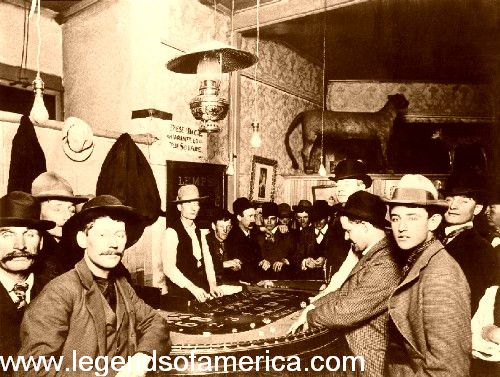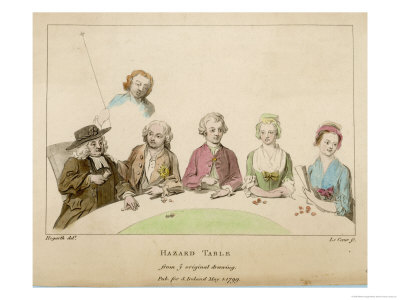Thread Rating:
Please have a look and let me know what you think.
Members with an interest in the etymology of the word Hazard may wish to visit a discussion of it in the Spanish word of the day thread.
"An explanation of Hazard of terminology"
5th line:
"the total that causes serves as the"
I know I've heard of Hazard before, but can't remember exactly where. It would not surprise me if it was addressed in John Scarne's book.
Quote: WizardThanks for those corrections.
I know I've heard of Hazard before, but can't remember exactly where. It would not surprise me if it was addressed in John Scarne's book.
I'm looking at Scarne on Dice right now -- there are several sections on Hazard. Not for nothing, he also has a section on controlled dice shooting.
Some details that I would like to see included:
-- Are odds bets part of the game?
-- Are the equivalent of "Come bets/hardways/props" part of the game?
-- What does the layout look like?
-- How is the "Main" tracked? Is there an "On-Off puck"?
Without really doing the math, my gut tells me that there would be a good play choosing the five or nine as the main, and placing the seven. What is the payout if you place the seven?
Thanks for this! I'll have to check out the Spanish word of the day thread, since I always thought this game (and the foundation of Craps) was French/Cajun in origin.
Interesting stuff.
Quote: IbeatyouracesThe only place I ever heard this game mentioned is in The Worlds Greatest Blackjack Book, and the authour calls it Three Dice Hazard.
If Three Dice Hazard is the same as Grand Hazard, I think it's just another name for Sic Bo (at least according to the description in Scarne's Encyclopedia of Games). "Normal" Hazard is played with two dice.
Quote: Ayecarumba-- Are odds bets part of the game?
-- Are the equivalent of "Come bets/hardways/props" part of the game?
-- What does the layout look like?
-- How is the "Main" tracked? Is there an "On-Off puck"?
I have no idea. The answers to these questions may have been lost in the passage of time.
Quote: 7crapsSN Ethier in his Doctrine of Chances 2010 book has a section on Faro (chapter 18) and a section on Hazard, both English and French versions, in the notes in the Craps section (starting page 517) Interesting stuff.
Thanks. Ethier doesn't mention any additional bets but does clarify the terminology and history of the game.
The Wizard's article includes a link for the Wikipedia Hazard article. That article says the same thing about Grand Hazard being similar to Sic Bo.Quote: ThatDonGuyIf Three Dice Hazard is the same as Grand Hazard, I think it's just another name for Sic Bo (at least according to the description in Scarne's Encyclopedia of Games). "Normal" Hazard is played with two dice.
It is an interesting chapter in the history of craps.
One can easily see how craps improved upon the rules of hazard
and why hazard became obsolete once it evolved into craps.
Quote: WizardThanks for those corrections.
I know I've heard of Hazard before, but can't remember exactly where. It would not surprise me if it was addressed in John Scarne's book.
May Mr. Scarne rest in peace.
He was born in Steubenville, OH, which isn't a far cry from where I am located. I believe that the game of Hazard was mentioned in, Scarne's New Complete Guide to Gambling which is a book that I own. If I can remember, I'll look for that tomorrow. The kids are asleep, so if I go into the playroom (where the bookshelves are located) I'm liable to trip over one of the any number of toys that are sure to be littering the floor and wake them up.
I have read the book in its entirety, and would say to my friends on here that few truer books about gambling have ever been penned.
2nd pic is a Grand Hazard table. 3rd pic is Chuck a Luck. 4th
is a Hazard table in 1900 making the slow change to modern
Craps. The 5th is an 18th century Hazard table. Bottom pic
is the whole Grand Hazard table, circa 1940.






Quote: kenarmanOn rule 5 the 4 is not mentioned. Is that an oversite? What happens on a roll of 4 if it is not an oversite?
You're right. I should have said 4 is also a "chance." Thanks for the correction.
Page 230 mentions Hazard as a precursor to Craps.
Pages 507-508 go into more specifics, but it's about three-dice Hazard.
Quote: Ayecarumba-- What does the layout look like?
-- How is the "Main" tracked? Is there an "On-Off puck"?
These features of the craps table, along with Bar-12, probably evolved after the removal of Craps from the streets into the casinos. Come and Don't betting was introduced to multiply line bet profits per hour. On the street, the shooter is the only Pass bettor - everyone else "fades" him (covers his "pass" bet dollar-for-dollar en total by betting that he will either roll 2, 3, or 12 coming out or set his point but seven-out). Notice that faders get paid even money when the shooter rolls a 12 coming out. Thus all pass-fade bets are self-banked and double-or-nothing, no "pushes". Faders simply have a 1.41% advantage over the single shooter.
Quote: Ayecarumba-- Are odds bets part of the game?
-- Are the equivalent of "hardways/props" part of the game?
Sometimes, "bleacher bets" on the next roll are known to happen, but the odds-paid depends on the mental (and moral!) integrity of the bettors involved, so you're on your own - pack, or at least keep a box cutter handy!
Quote: AyecarumbaWhat is the payout if you place the seven?
For a Main of either [5] or [9], natural odds are 4-to-6 or 2-to-3, so Place odds might be 5-to-8 (E = -2.5%)?
For a Main of either [6] or [8], natural odds are 5-to-6, so Place odds might be 4-to-5 (E = -1.82%)?
Quote: AyecarumbaI always thought this game was French/Cajun in origin.
The name "craps" is short for French crapauds, meaning "toads".
Quote: ThatDonGuyIf Three Dice Hazard is the same as Grand Hazard, I think it's just another name for Sic Bo (at least according to the description in Scarne's Encyclopedia of Games). "Normal" Hazard is played with two dice.
The only real difference between Sic-Bo and Grand-Hazard layouts is the latter's lack of dice-pair bets, what I like to call the "Domino" and "Firmways" bets, that any two of the three dice will bear a specific X&Y or X&X combination. Also, Sic-Bo dubs a X&X&X roll "Triplet", while Grand-Hazard names such a beast a "Raffle". Strangely, both lack a plausible "Straight" bet, that all three dice will bear consecutive numbers. This can happen 24 out of 216 ways, so a 7-to-1 (E = -11.11%) "Any Straight" bet should have evolved for one or the other by now.
Quote: sodawaterWizard, i think you inverted the last two entries on your terminology chart:
If I'm not mistaken, the Hazard equivalent of "Come-out loser", or "crap-out", is "throw-out" rather than "nick-out". Also, I think street-craps calls a setter a "fader", which is like a "Don't" bettor.
Quote: sodawaterWizard, i think you inverted the last two entries on your terminology chart:
A "caster" is from Hazard, and a "shooter" is from craps.
Quote: sodawaterWizard, i think you inverted the last two entries on your terminology chart:
You're right, thanks for the correction.
I've seen Sic bo described as being an ancient Chinese game, but have never seen anything in Chinese from earlier than the Twentieth Century that mentions it. I think that both Sic bo and Chuck-a-Luck can trace their heritage directly to Hazard. FWIW.
Quote: heatherUsing three dice while allowing single-number bets to pay out even money or better, bettors miscalculate by thinking that the odds of a single number hitting on any one of the three dice are 1/2 (1/6 with three chances to hit = 3/6 = 1/2). This is a mistake and the odds are always 1/6, but there being three dice has consistently confused people in this regard.
My calculations indicate that there are 91 ways to roll a given number on any single die of three, six-sided dice. There are 216 combinations with three dice.
So, 91/216 (or 42.13%) is the probability that I get for the "number-on-any-single-die" bet.
However, the Sic Bo math on wizardofodds.com apparently differs from both of our calculations (see the "specific number" section): https://wizardofodds.com/games/sic-bo/appendix/1/ The page indicates that there are 75 possible combinations for the "number-on-any-single-die" bet (see "The probability of rolling one of a specific number). Interestingly, the line directly above says, "The probability of rolling zero of a specific number is (5/6)3 =125/216," which suggests that there are 91 remaining combinations (out of the 216) in which a specific number can appear on any die of three dice.
I am going to double-check my math.



